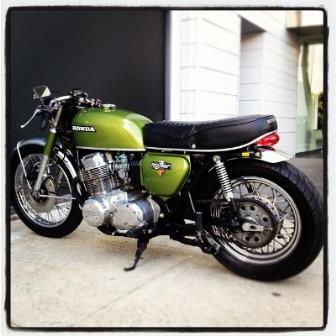
, For centuries people with artistic instincts have used mediums to unleash their intuitions; the magic moment of eureka where the vision takes a physical shape. The thumping sound has always allured generations. Custom motorcycles are distinct motorcycles that are sculpted and molded from the original mass-produced machines. Often motorcycles are associated with style and glamour; it is a symbol of rebellion, freedom, and protest.
Custom bikes have been part of a lifestyle or we can say a style statement. Customized motorcycles are a unique piece of art. Although, motorcyclists use to modify the looks of their machines; the first customized motorcycles started to appear in the early 1950s. Ben Hardy and Alen Ness created the first crop of customs motorcycles known as choppers. In the 1990’s it became a lifestyle symbol.
Types of custom motorcycles
There is not enough information and knowledge about motorcycle customization. Though there are no specific arms in customization; certain terms and words are used to identify different designs.
Bobber :
The Bobber was first of a kind custom motorcycle. They were customized by individuals with high mechanical skills. Bobber simply means made smaller; every extra feature was removed like the front fender and the rear fender. It was done to remove the weight of the motorcycle itself. Custom motorcycle trend started in the early 1940s and 50’s when American soldiers in WWII were inspired by European motorcycles which were lighter. They started working on ex-military motorcycles. The idea was to create a motorcycle with a minimum maintenance workload.
Relation with Choppers: Bobbers are related to Choppers as they are the predecessor. A Bobber is built with a minimalistic approach; it is stripped of its parts that are not needed. Bobbers are made with unmodified frames whereas Choppers are cut and modified into different shapes. Bobbers are easy to create and are usually hand-built, but they lack the aesthetic appearance of the choppers. Bobber customizers usually practice an economical approach while building their machines involving old second-hand parts and hand-machined parts.
Bobbers are typically made at garages and they reflected the builder’s lifestyle. New Bobbers are made to reflect individuality rather than for cost efficiency. They have also inspired manufacturing companies like Harley-Davidson and Honda to create their custom-designed Bobbers.
Chopper :
A chopper is modified from the original design or it is built from scratch to have a unique design. It can be summed up as creating an idea as a physical product. The “Captain America” and “Billy Bike” as seen in the 1969 movie Easy Rider are the most well-known choppers. Some of the prominent features of Choppers are long front ends; hardtail frames, tall or short handlebars, larger front wheels, and stretched frames. Choppers are the union of many parts found on other motorcycles; they are modified to be unique and smaller. Most of the parts removed are the front fender, turn signals, speedometers, electric starters, chain guards, and various other parts.
Many of the earliest choppers were made using Flathead, Knucklehead, and Panhead engines which were found in military and police motorcycles. As new engines came into the market, they were used in choppers. British and Japanese motorcycle manufacturers were popular in the 1960s with Triumphs being the most popular motorcycle for Choppers. The Honda 750-4 was a widely preferred Japanese engine that was used by customizers. Even though Choppers are created using different engines; older air-cooled designs are preferred. Over the years Chopper designs have evolved to more artistic and aesthetic directions rather than performance-oriented. Japanese and European motorcycles engines were running in most Choppers and Bobbers in those years. In the same years that Choppers and Bobbers were invented and popularized in the U.S; Europe saw the birth of Cafe Racers.
Café Racer :
Cafe Racers are classic customized motorcycles that were made for speed rather than ease. They were customized for rides over small distances. The term “Cafe racer” was coined by early British motorcycle adopters of the 1960s. Cafe racers were particularly used for short and quick rides between cafes and bars. Cafe racers resembled the grand Prix racing motorcycles of the 1960s. They can be easily distinguished with their indentations in the tank, racing handlebars, striking seat bonnet, and lengthened fuel tanks. The elegance of the café racer can be seen in the movie Tron: Legacy.
Cafe racers have evolved with time. Japanese motorcycles replaced the then-popular British bikes, changing the looks of the Grand Prix racing bikes. The unpainted aluminum fuel tanks were replaced by narrow fiberglass tanks. Kawasaki’s two-stroke and Honda’s four-stroke were the basis for this conversion. Many manufacturers acknowledged and started manufacturing cafe racers, but they were disappointed with their sales and results. Custom motorcycle builders continued to build cafe racers with the same designs. Many European companies like BMV, Benelli produced their factory variants without any modifications. Followers of Cafe Racers have a distinct image; they have a certain cult, they are associated with rockabilly music and culture. Lifestyle trends have continued with Cafe Racer. Google trends show the number of searches for “Cafe Racers” has increased since 2010.
Cutdown :
Scooters with removed bodyworks or cutaways are known as cutdowns. It is associated with many sub-cultures across Europe. Cutdown was popular with British youths in the 1970s and 1980s. While most of the British youth appreciated the metropolitan looks, some viewed cutdowns as a mode of transportation. Many modifiers remove the unneeded parts from the frame to improve the power of the scooters. Tail sections, leg shields were removed to give it a distinct look.
Cutdowns have special drag racing festivals. They race in different categories which include cutdowns and heavily modified racing scooters. For these races, accessories had to be removed from scooters and performance-enhancing fuels were disallowed. Another type of scooter known as “naked scooter” was designed and manufactured by companies, but the difference was that Cutdown were regular motorcycles that were modified later whereas naked scooters are designed as “bare bones” scooters.
Rat bike :
Whoever has watched the Mad Max film series would instantly recognize Rate Bikes. They are those bikes that have become old, dusted, and rusted. like the old warhorses, which have fallen over time but are still maintained by applying quick solutions fixes. Rate Bikes looked similar to survival bikes which are modified for stylistic reasons.
In contrast, rate bikes are kept up and maintained for little or no cost. The concept of Rat Bikes is in maintaining a motorcycle for the maximum amount of time with little investment. The origin of the term “Rate bikes” is still a mystery, but it can be ascribed to popular magazines. Rate bikes are painted in black, which gives them a classic rusted and rough look.
Streetfighter :
People who were more inclined to the aggressive look of motorcycles started customizing sportbikes by removing the front fairing. A classic illustration of Streetfighter includes large pair of headlights, upright handlebars, short and loud. Modern streetfighters used frames that were customized to nullify the weakness of the tubular frames of the early 4-cylinder sportbikes. These motorcycles became beautifully crafted pieces of art.
Though they were influenced by the Cafe Racers culture of the 1950s and 1960s, they were inspired by Japanese bikes of the late 1970s and 1980s. Streetfighters were made popular by European riders. They gained popularity all over the world, and companies started building their prototypes. Ducati, Honda, Triumph started producing their custom build Streetfighter.
Tribsa and Triton :
Tribsa or Tri-B.S.A was the fusion of Triumph and BSA motorcycles. They were built as cafe racers or off-road dirt bikes in the 1960s and 1970s. The aim was to build superior motorcycles. Tribes had a triumph engine installed in the BSA frame. The BSA frame was considered stronger than the triumph. Often it can be seen in vintage of-road festivals.
Tritons are similar to Tribsa as they are a combination of two motorcycles. Tritons were customized motorcycles in which Triumph engines were fitted in Norton frames. They were not factory models but hybrid bikes built in the 1960s and 1970s. The combination of Triton and BSA gave superior-looking motorcycles. They were built as cafe racers.
This was a small introduction to customized motorcycles. If you have any resources about another form of customized motorcycles please let us know. Customized motorcycles represent the creative endeavors of humans, so we must preserve and encourage such kinds of creative and intelligent work.
Image source:
www.flickr.com/photos/iheartjulia/
www.flickr.com/photos/x1brett/
www.flickr.com/photos/satguru/
www.flickr.com/photos/28096801@N05/
www.flickr.com/photos/markyharky/
www.flickr.com/photos/big-ashb/
www.flickr.com/photos/martintopping/
www.flickr.com/photos/ronsaunders47/
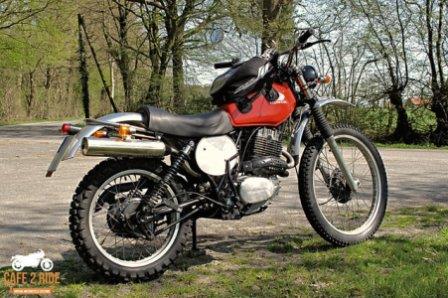
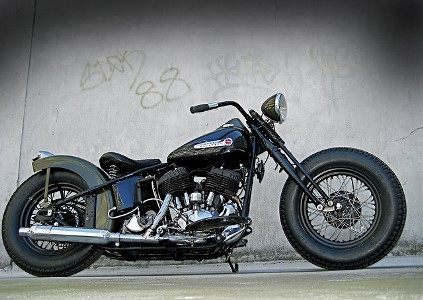
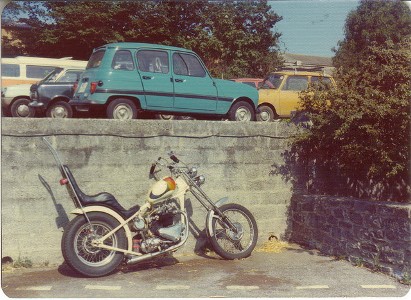
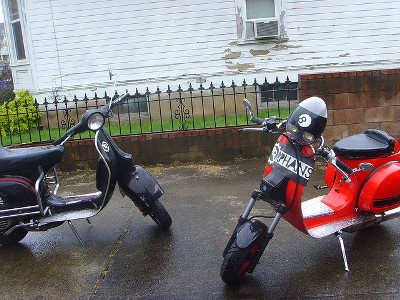
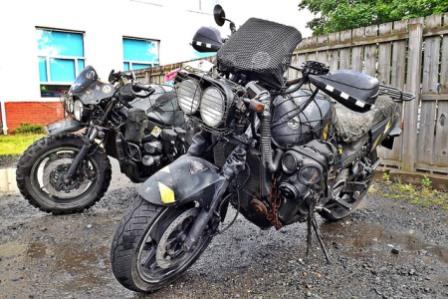
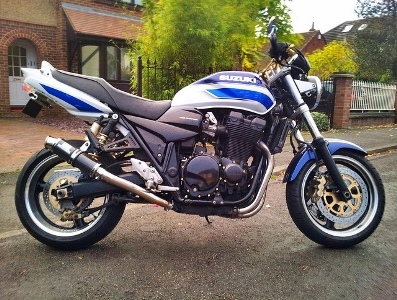
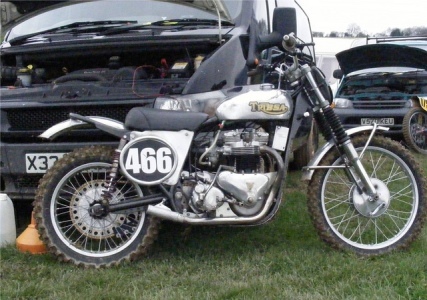
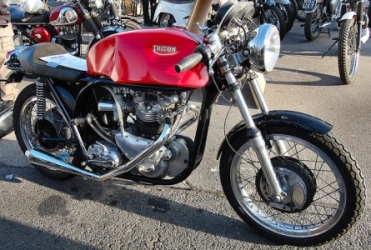

Great Content! I really like your efforts for writing this knowledgeable content. Some points you have mentioned here are really amazing. Thanks a bunch of sharing. 🙂
Thanks Lesa for giving your time.
What got me interested in the history of motorbike customization are the Mad Max-type rat bikes. I’m sure Grandpa would appreciate having his heavy, clunky vintage bikes painted black and refurbished to look like heavy metal warriors. He’d be surprised that customizing them this way is actually low cost. What’s surprising is that this style of customization helps bike owners keep their bikes for the longest time without investing too much except on a few paint jobs to give the bike a rough, tough look!
Thanks Angel,
Every generation had their custom culture. They are inspiring for custom builders